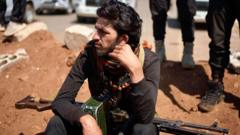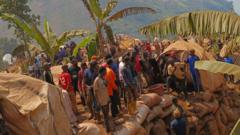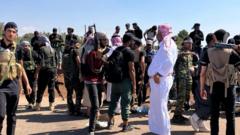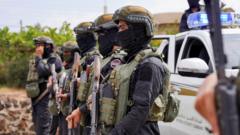The trial of Joseph Kabila, the former president of the Democratic Republic of Congo, has commenced in Kinshasa, where he faces serious allegations including treason and murder linked to his purported support for the M23 rebels.
Kabila Faces Treason Charges in DR Congo Military Trial

Kabila Faces Treason Charges in DR Congo Military Trial
Former president accused of orchestrating rebel activities amid ongoing violence in the east.
Former DR Congo president Joseph Kabila is on trial in a military court in Kinshasa, facing accusations of treason and murder that arise from his alleged backing of the M23 rebel group, which occupies large portions of the country's mineral-rich eastern regions. Kabila has dismissed the charges, denouncing the proceedings as an "arbitrary" use of the judicial system to oppress him. Tensions remain high as clashes continue despite a recent ceasefire agreement between the government and the M23.
Kabila, who ruled for 18 years after succeeding his assassinated father Laurent, recently returned from a two-year exile in South Africa. He was reintroduced to the political landscape after the upper house of the legislature lifted his immunity as a senator to permit these investigations and legal actions. Current President Félix Tshisekedi has publicly accused Kabila of orchestrating the M23's actions, while Kabila, in recent statements, has branded the current leadership as a "dictatorship," lamenting a decay of democracy.
Kabila's trial has drawn criticism from his supporters, who claim that the state is applying double standards—being lenient with the rebels while aggressively targeting Kabila. Ferdinand Kambere, a former ally, suggested the trial serves to sideline Kabila from future political influence in Congo. Meanwhile, the international community, led by the UN and various Western nations, has called attention to the involvement of neighboring Rwanda, accused of backing the M23, although Rwanda vehemently refutes these claims, asserting that it is merely acting to prevent regional instability.
As the trial unfolds, Kabila's rejection of the charges and his assertion of governmental oppression loom over his legacy and the current political climate in the DR Congo.
Kabila, who ruled for 18 years after succeeding his assassinated father Laurent, recently returned from a two-year exile in South Africa. He was reintroduced to the political landscape after the upper house of the legislature lifted his immunity as a senator to permit these investigations and legal actions. Current President Félix Tshisekedi has publicly accused Kabila of orchestrating the M23's actions, while Kabila, in recent statements, has branded the current leadership as a "dictatorship," lamenting a decay of democracy.
Kabila's trial has drawn criticism from his supporters, who claim that the state is applying double standards—being lenient with the rebels while aggressively targeting Kabila. Ferdinand Kambere, a former ally, suggested the trial serves to sideline Kabila from future political influence in Congo. Meanwhile, the international community, led by the UN and various Western nations, has called attention to the involvement of neighboring Rwanda, accused of backing the M23, although Rwanda vehemently refutes these claims, asserting that it is merely acting to prevent regional instability.
As the trial unfolds, Kabila's rejection of the charges and his assertion of governmental oppression loom over his legacy and the current political climate in the DR Congo.




















